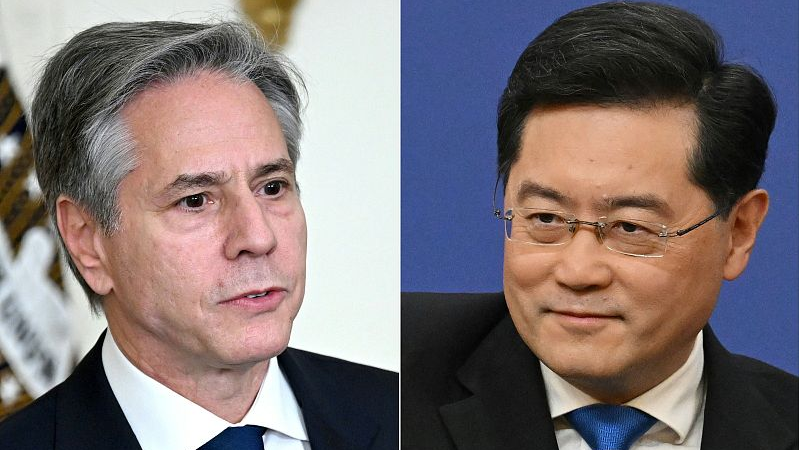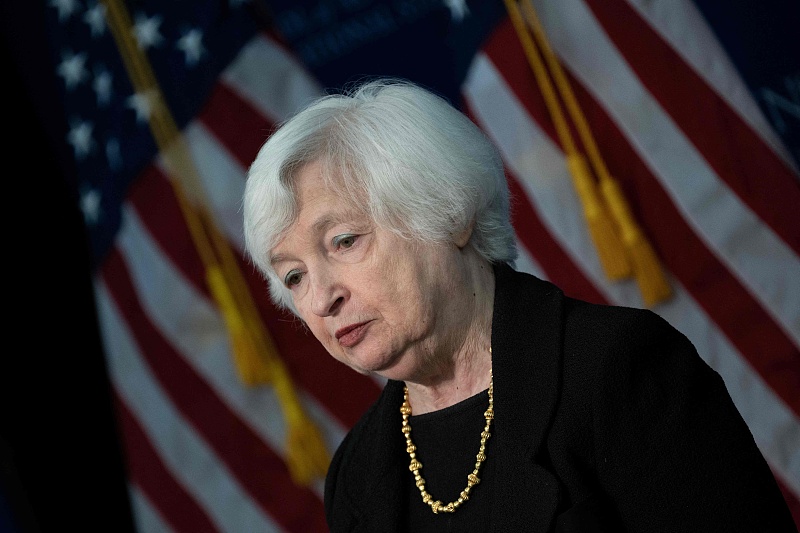
U.S. Secretary of State Antony Blinken and Chinese State Councilor and Foreign Minister Qin Gang. /CFP
U.S. Secretary of State Antony Blinken and Chinese State Councilor and Foreign Minister Qin Gang. /CFP
Editor's note: Azhar Azam, a special commentator on current affairs for CGTN, works in a private organization as a market and business analyst and writes about geopolitical issues and regional conflicts. The article reflects the author's opinions and not necessarily those of CGTN.
In a telephone conversation with Chinese State Councilor and Foreign Minister Qin Gang, the U.S. Secretary of State Antony Blinken emphasized the importance of maintaining "open lines of communication," which has now become a catchphrase of the Biden administration, to "responsibly manage" the relationship and move forward on an "open, candid" and "vitally important" conversation between the presidents of the two countries at the G20 summit in Bali.
After the U.S. House Speaker Nancy Pelosi's rabble-rousing trip to the Taiwan region last year, Blinken's planned visit to Beijing in February prognosticated a thaw, yet the U.S. inflation of the weather balloon saga as a "national security threat" to call off the trip and sanctions on Chinese firms over their alleged close ties with China's military dashed the U.S. President Joe Biden's pledge to sensibly manage differences, prevent conflict, work together on urgent global issues and maintain open lines of communication.
The U.S. is just pretending to renew diplomatic talks with China and stabilize a tense relationship. Washington indeed isn't interested in undergirding or bringing some sort of stability to the relationship for it is acclimatized to shuttering communication channels and exploiting every opportunity to cripple the bilateral relations and hobble China's economic and technological growth.
On Monday, the Biden administration added several Chinese companies to the U.S. Commerce Department's export control list. Washington's willingness to engage Beijing remains vague as its policies seek to bide time until another instance arrives to break off the negotiations.
Blinken is gearing up for a trip to Beijing. What's truly essential during this trip is not to move beyond mere discussion and focus on concrete action. A "candid and productive" engagement to ameliorate the bilateral relationship and overcome economy, trade, and investment rows between the two powers is crucial; exchanges, whenever they take place, should be backed by concrete action in these areas as well as in respecting each other's independence.
Aimed at restricting China's economic and technological growth, the Section 301 Investigation against China is one of the major areas of concern that seek immediate redressal as tariffs under the controversial legislation have to date cost Americans about $182 billion, according to the U.S. Custom and Border Protection, and the U.S. Treasury Secretary Janet Yellen has warned it will be "disastrous" for the country to destabilize the critical Sino-America trade and economic relationship.

U.S. Treasury Secretary Janet Yellen speaks at Johns Hopkins University's School of Advanced International Studies in Washington, D.C., April 20, 2023. /CFP
U.S. Treasury Secretary Janet Yellen speaks at Johns Hopkins University's School of Advanced International Studies in Washington, D.C., April 20, 2023. /CFP
Earlier this year, the United States Trade Representative (USTR) received nearly 1,500 comments against tariffs that former President Donald Trump placed and his successor maintained. A majority of them complained these tariffs had put significant pressure against bank loans and credit lines, pushed consumer prices by 35-40 percent, raised the cost of transit projects, triggered a 9 percent reduction in headcount, and led to a decline in wages, employment and investment with onshoring not proving cost-effective due to 200 to 300 percent higher prices of raw materials compared to China.
Trade between Beijing and Washington mostly benefits American firms, consumers, and the economy. As tariffs are absorbed by importers, passed on to consumers, or shared between them, either way, they are wreaking real pain to the U.S. firms, consumers, and economy, necessitating a sharp reduction, if not complete elimination, on Chinese goods.
Disenchanted with the trade war for it has raised their production costs, small and large businesses in the U.S. have been demanding their federal government end Trump-era levies on Chinese imports. The U.S. Chamber of Commerce wants tariff relief; the Information Technology Industry Council is urging the USTR to completely roll back the Section 301 duties. The biggest lobbying group in the U.S. and the global tech trade association share common views: These tariffs jeopardize America's manufacturing competitiveness, exacerbate inflation effects and inflict "undue economic hardships" on domestic companies, workers, and families.
The Biden administration should avoid treading on the same risky path and deliver on its word to hold candid talks with China to damp down tensions around trade, technology, and other issues. Pelosi's visit to the Taiwan region last year risked unintended consequences for the region; the U.S. needs to set some guardrails on this core question to prevent the competition from veering into a conflict.
Blinken recently re-expressed concerns China may be considering the provision of weapons to Russia, admitting the U.S. hadn't seen the "line crossed." This as well as other actions such as export controls and foreign investment reviews are the major irritants to "thaw" the relationship. A hype-up on a mendacious and unfounded story about the alleged Chinese spy base in Cuba, ignoring the U.S.'s illegal military facility in Guantanamo, reveals the U.S.'s double standards and may complicate the bilateral relations with China.
The rivalry between the two world powers is neither desirable for them nor for the rest of the world. China and the U.S. have plenty to disagree about, yet only inclusive, meaningful talks on trade, technology, climate change, global peace, and respect for each other's sovereignty can cut the first turf and make a new start. The number of exchanges perhaps won't produce results unless Washington chains its pledges and assurances with actions and deeds. This is the area the Biden administration needs to focus on to turn over a new leaf to protect "the most consequential bilateral relationship" in the world.
(If you want to contribute and have specific expertise, please contact us at opinions@cgtn.com. Follow @thouse_opinions on Twitter to discover the latest commentaries in the CGTN Opinion Section.)